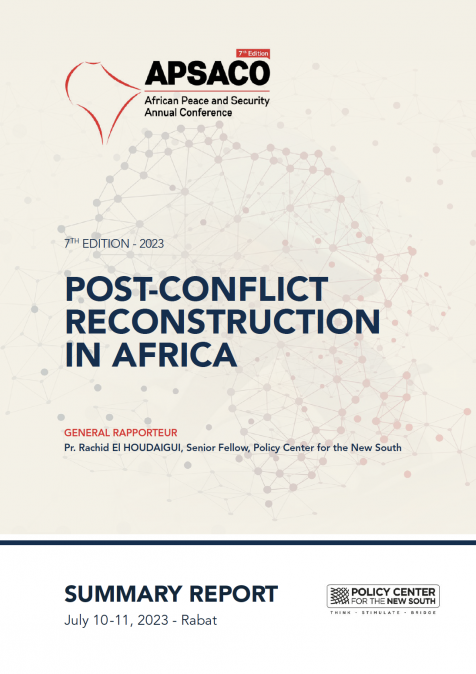Publications /
Book / Report
The Policy Center for the New South organized the 7th African Peace and Security Annual Conference (APSACO) on July 10-11, 2023, under the theme ‘Post-Conflict Reconstruction in Africa’. This annual conference provides a platform for the analysis of Africa’s peace and security structures and institutions, focusing on the continent’s assets, history, and its ability to overcome current and emerging challenges and gain global competitive advantage.
The debate on post-conflict reconstruction has been spurred in recent years by African efforts to provide the continent with a policy framework for the post-conflict or post-crisis period (political transition), in line with the African Union Peace and Security Architecture (APSA), and in the context of the African Governance Architecture (AGA). This concern for sustainable peace on the continent is behind the adoption in Banjul (Gambia) in 2006 of the ‘AU Policy Framework on Post-Conflict Reconstruction and Development’ (PCRD), and the establishment of the African Solidarity Initiative (ASI) in July 2012 to coordinate continental financial contributions to the program.
The PCRD review workshop, organized by the AU Peace and Security Commission (PSC) in Accra, Ghana, in September 2022, proposed a better tailored understanding that is more adapted to the new challenges. These realities are not only limited to the changing nature of crises, but also to the issues of financing, the new forms of partnerships, the roles of African actors in creating the best conditions for the deployment of PCRD, and finally, the appropriation by states in post-conflict situations of the responses provided by the PCRD. The new version was validated at the meeting held in Cairo, Egypt in March 2023.
The effects of the PCRD in 2023 will, however, depend largely on its implementation. The previous framework essentially suffered from a lack of African and international political will. The new framework needs outstanding leadership and capacity to mobilize national, regional, and multilateral stakeholders to advance comprehensive solutions to the security, political, and socioeconomic challenges of post-conflict reconstruction.
The seventh African Peace and Security Annual Conference (APSACO) aimed to deepen the comparative knowledge on the challenges and catalysts of the implementation of peacebuilding in Africa in general, and PCRD in particular, through the following perspectives:
- Collective security in Africa: towards a new conceptual framework?
- What prevention measures are needed to sustain peace?
- African solidarity in times of financial crisis
- For an effective global partnership to enhance the PCRD
APSACO brings together experts from different parts of the world, fields, and professions—from the military and political world to academia and civil society—to promote high-level conversations on peace and security in Africa.






